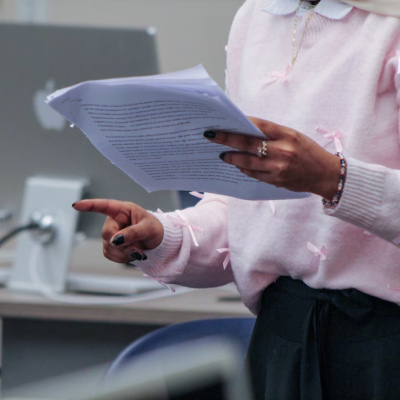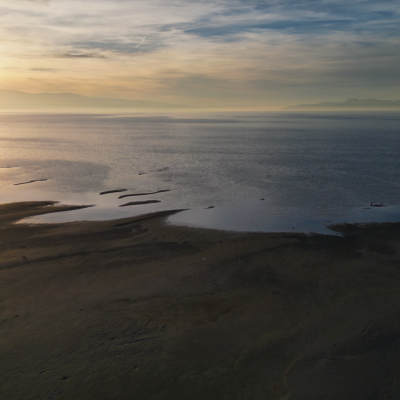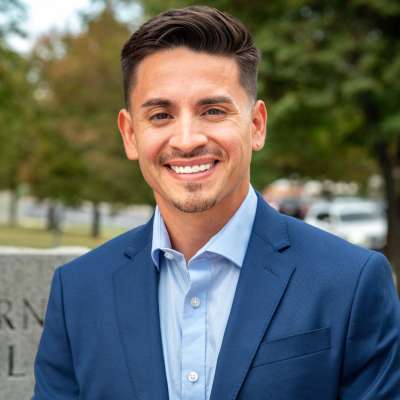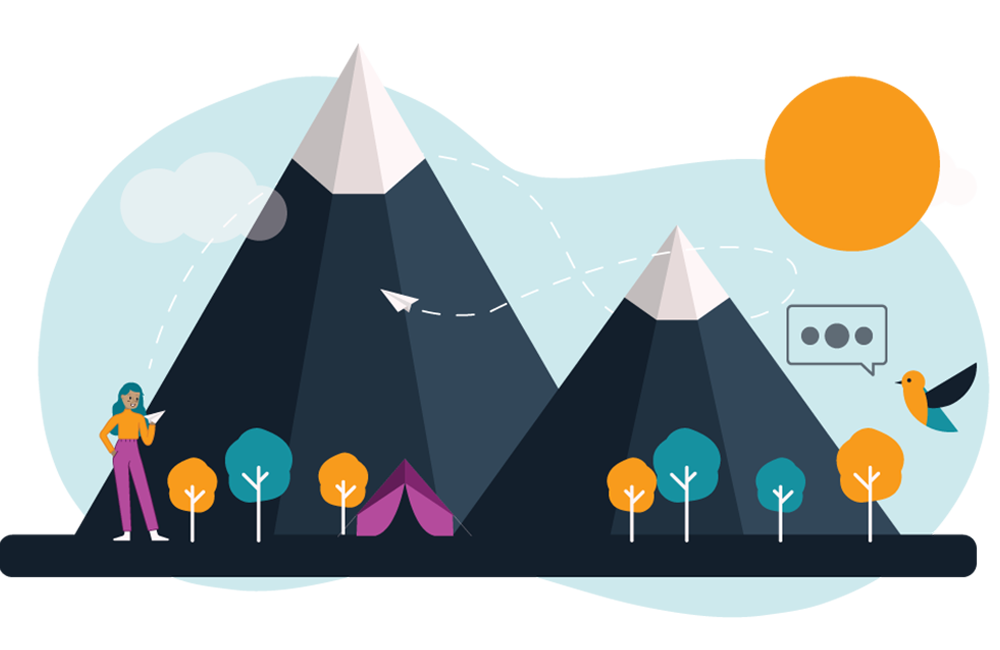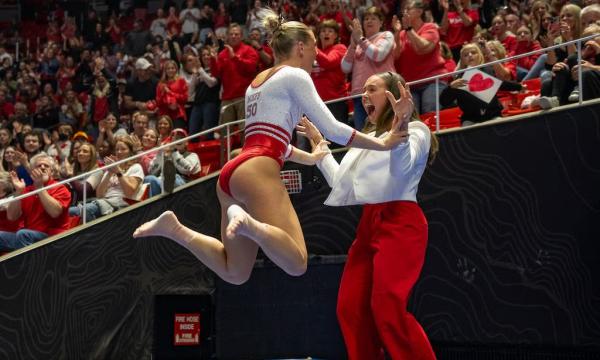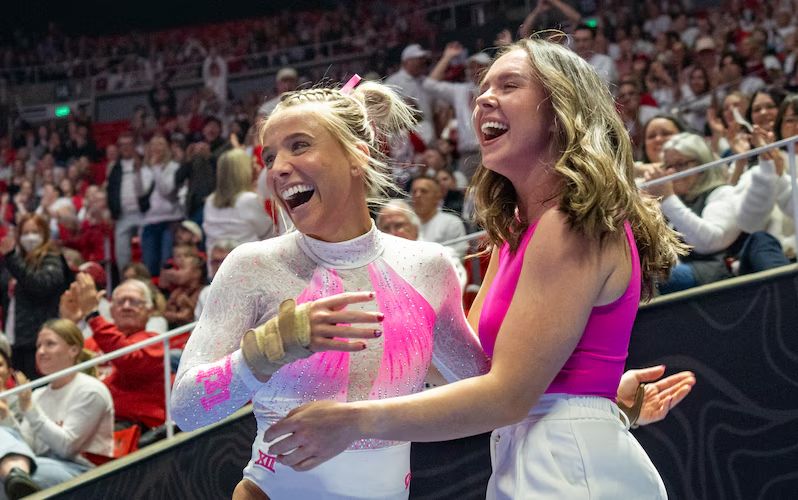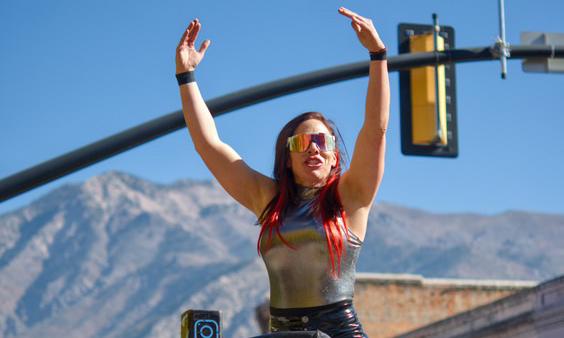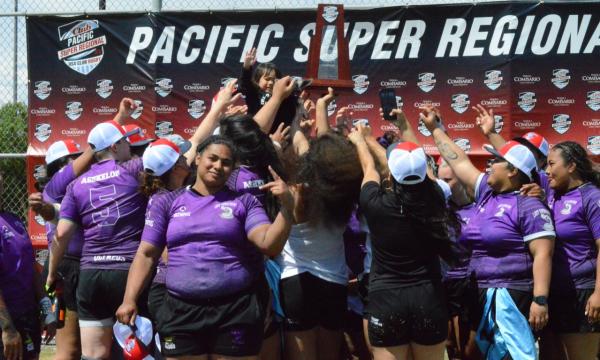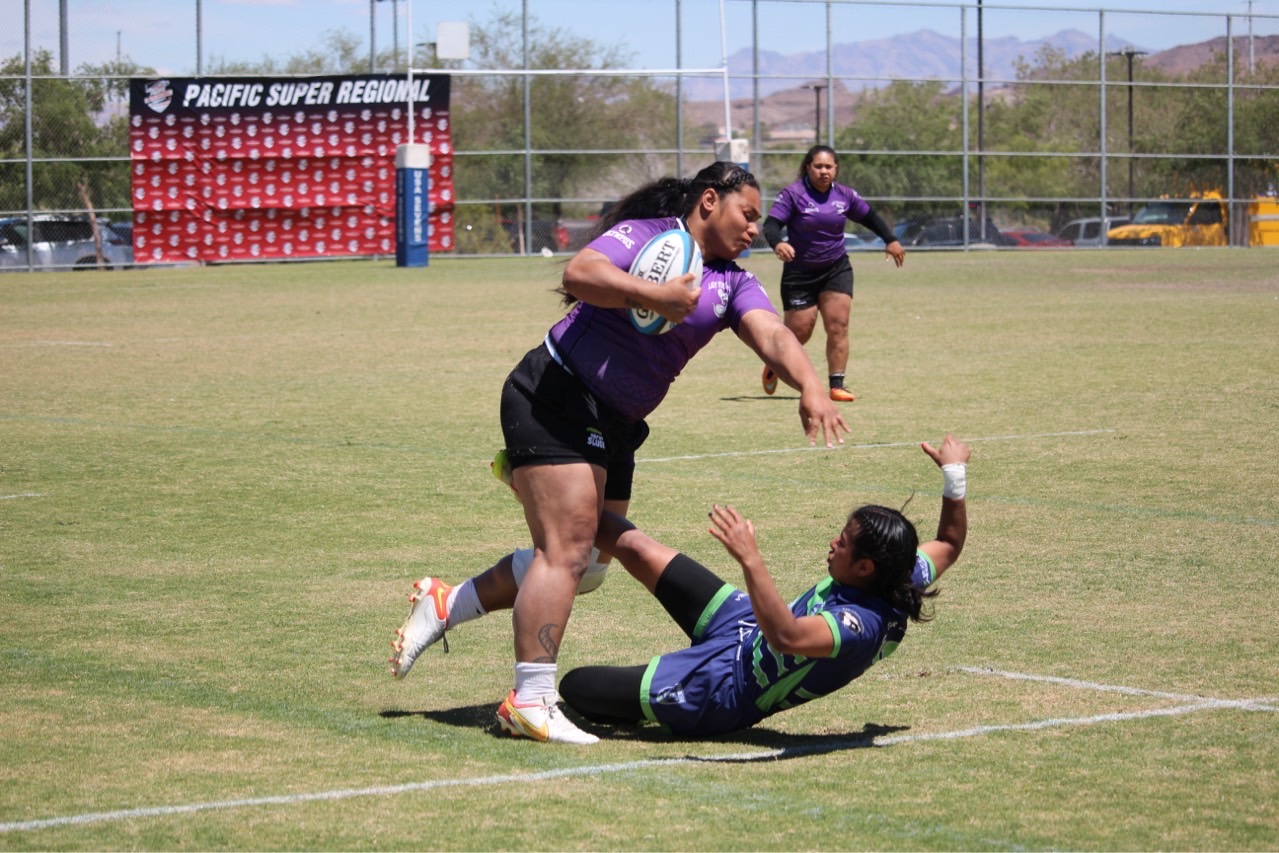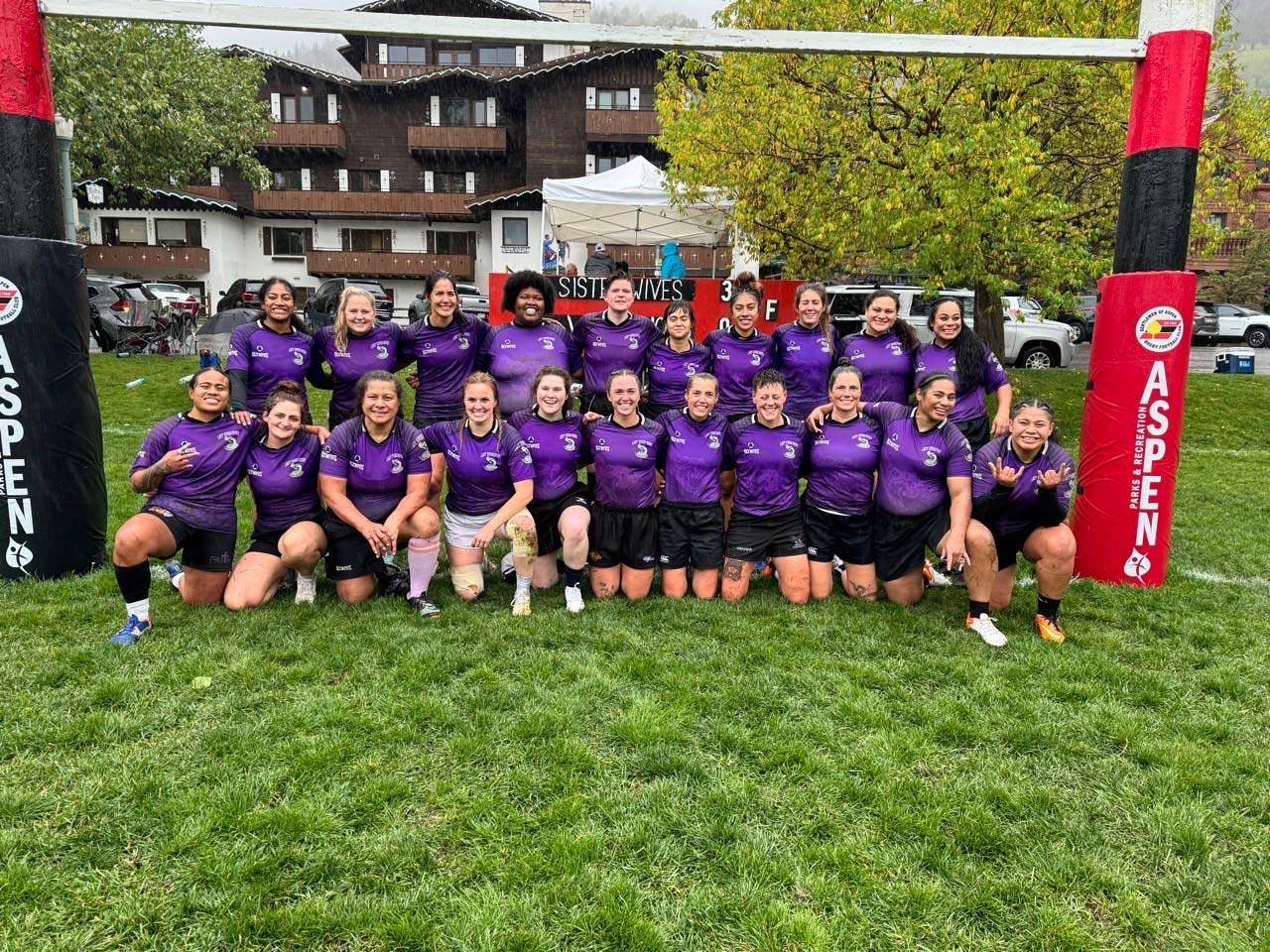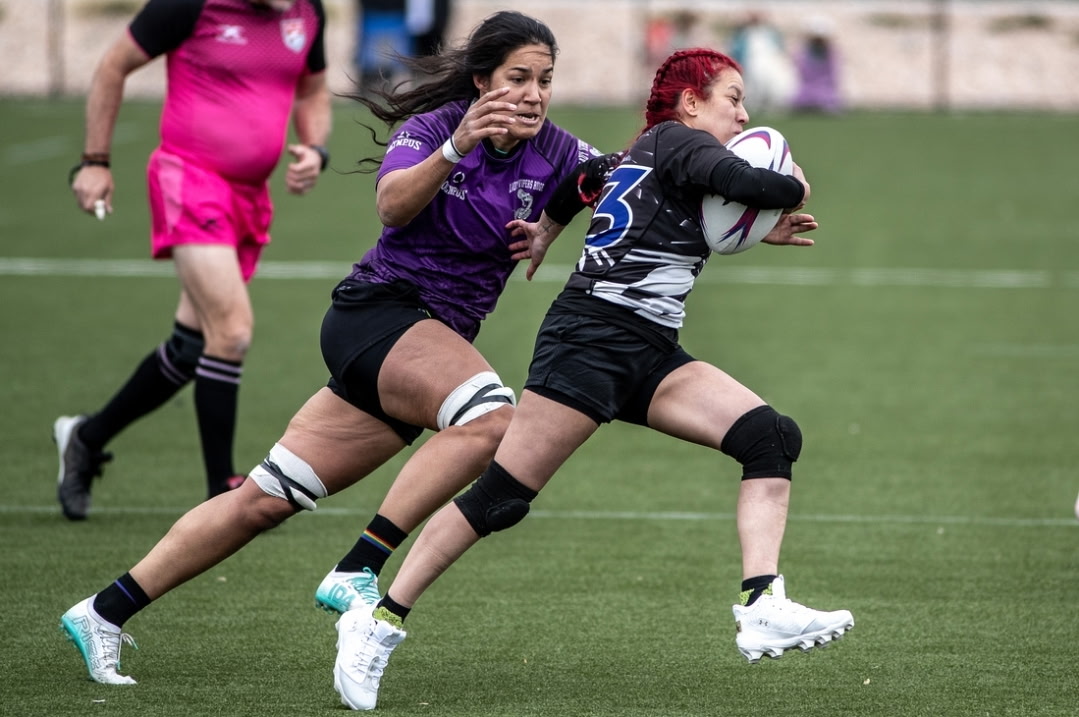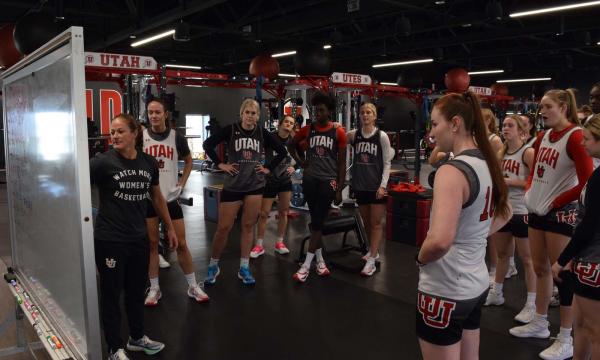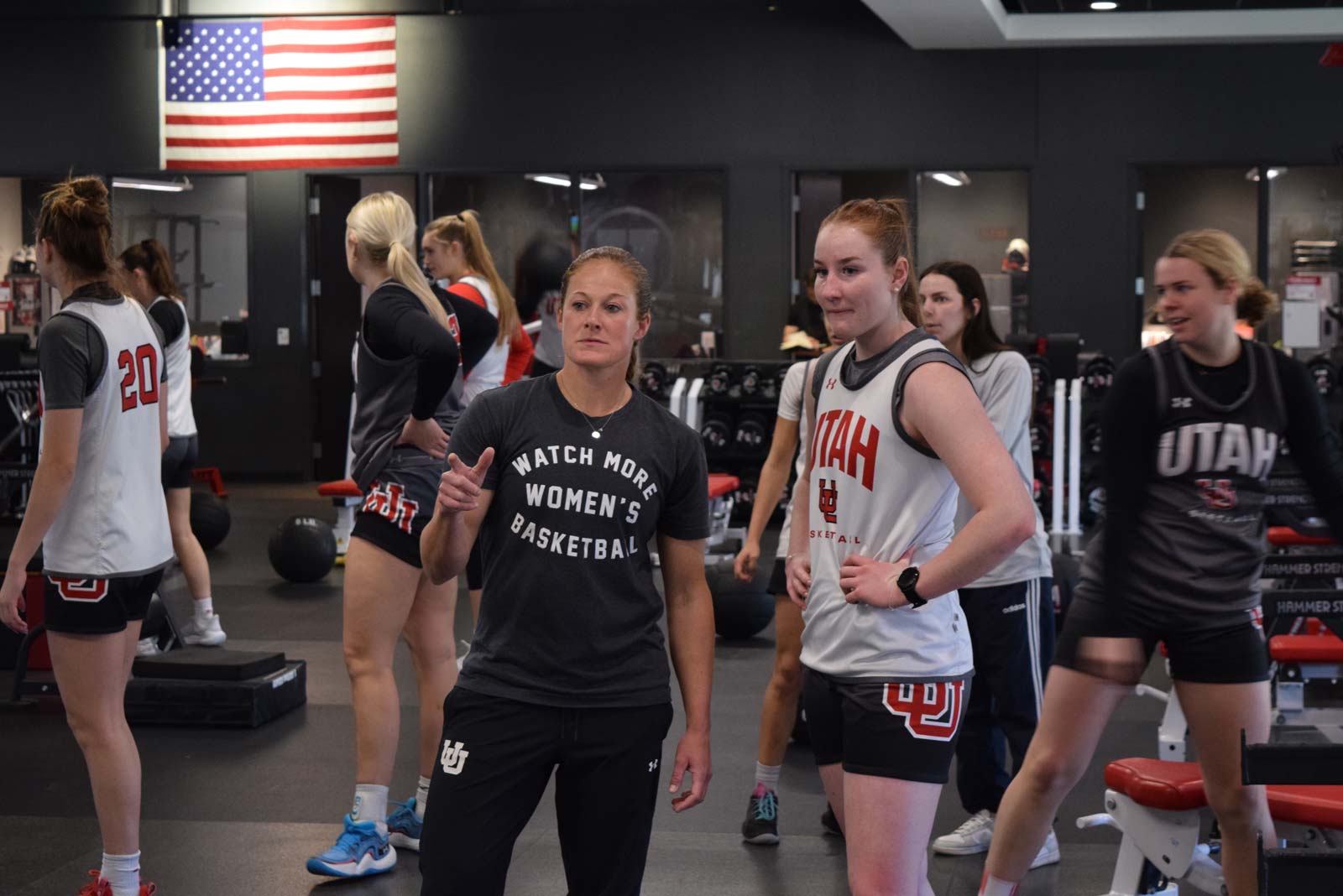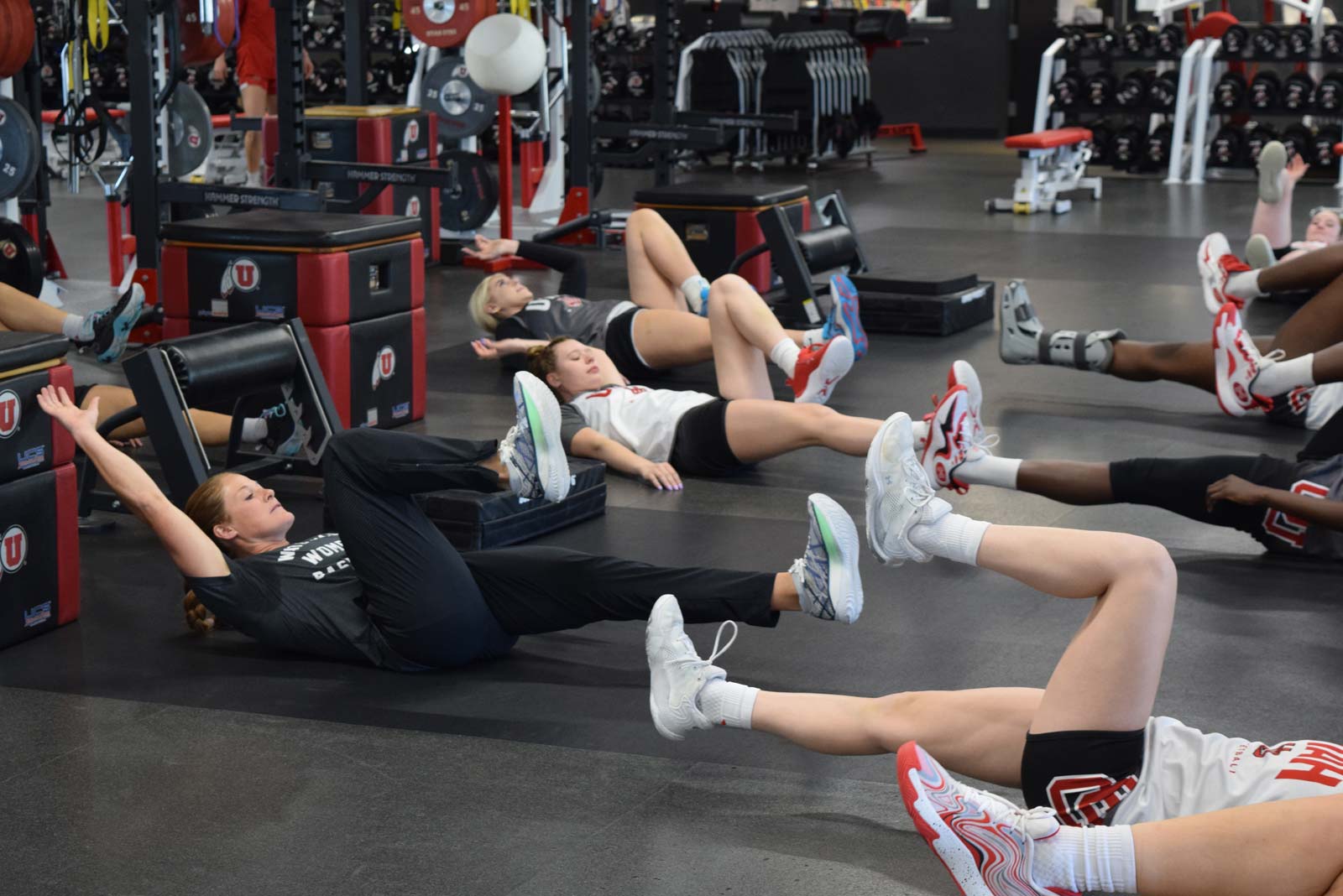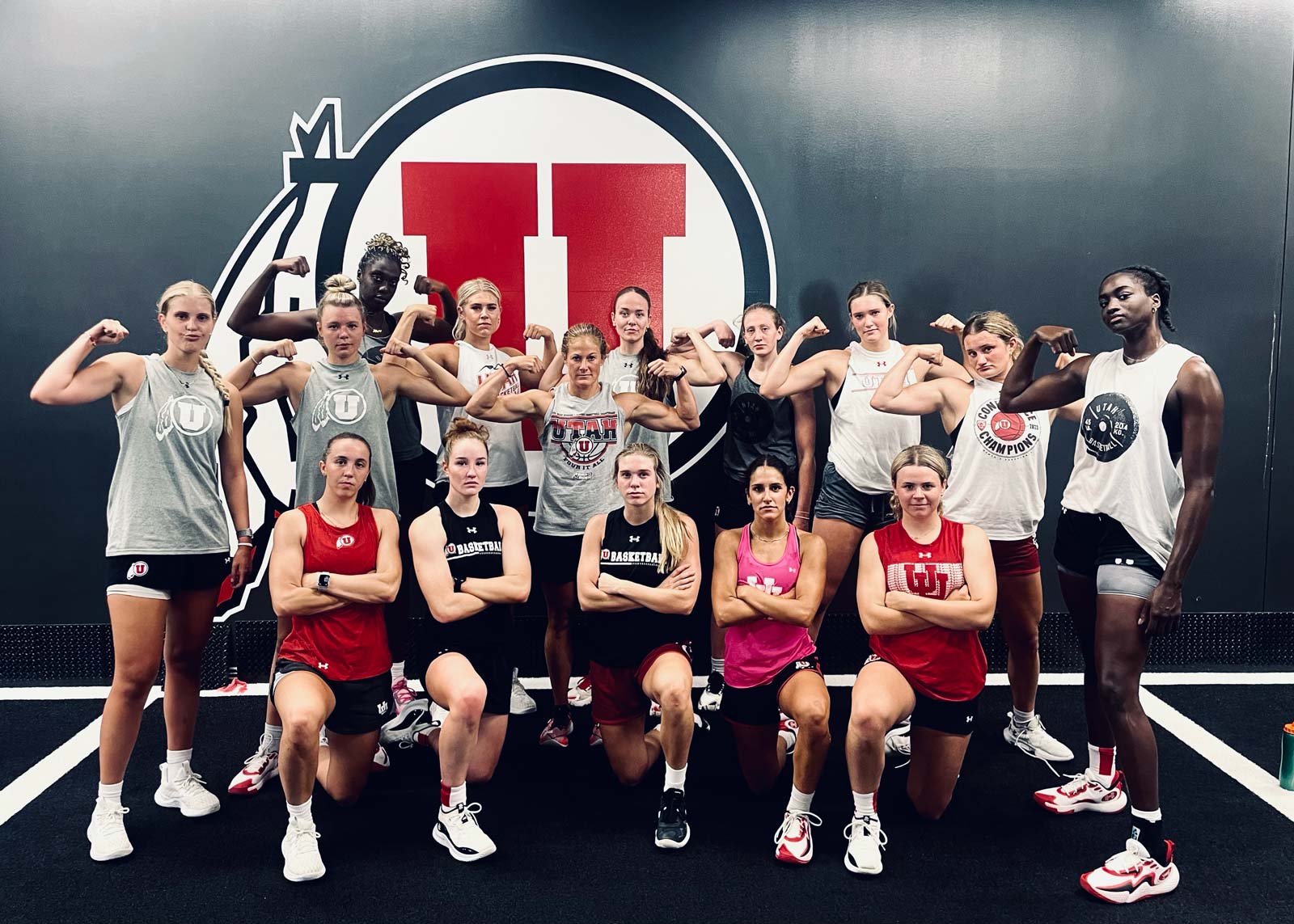This story is jointly published by nonprofits Amplify Utah and The Salt Lake Tribune to elevate diverse perspectives in local media through student journalism.
The backstage is scattered with bags, water bottles and weights. Shirtless men in colorful spandex outfits pump iron while waiting for their turn to enter the ring. An operator watches a live feed of the match outside, waiting to cue the wrestlers that it’s their time to fight.
Jeanette Langston waits to hear her name. She’s watched some of the feed, trying to get a feel for the crowd’s energy and what they’re responding to.
But she’s anxious. In a few moments, she will need to transform into someone else. And she’s not quite there yet.
One of her teammates approaches, looking to joke around and chat. At first, Langston recognizes this man as a friend. Then it strikes her: In a few moments, this man will be her opponent.
No — this man is the enemy.
A chauvinist pig. A paper-thin patriarch. A toxic relic. He’s everything that is wrong with men, with the world. An embodiment of the systems of power that are keeping women down and tearing the world apart.
She looks up in silence and glares. The man is at first surprised, then angry. She’s angry, too.
Now she’s there. The transformation is complete.
She’s no longer Jeanette Langston. She’s Benita Jean. And she’s ready for this match.
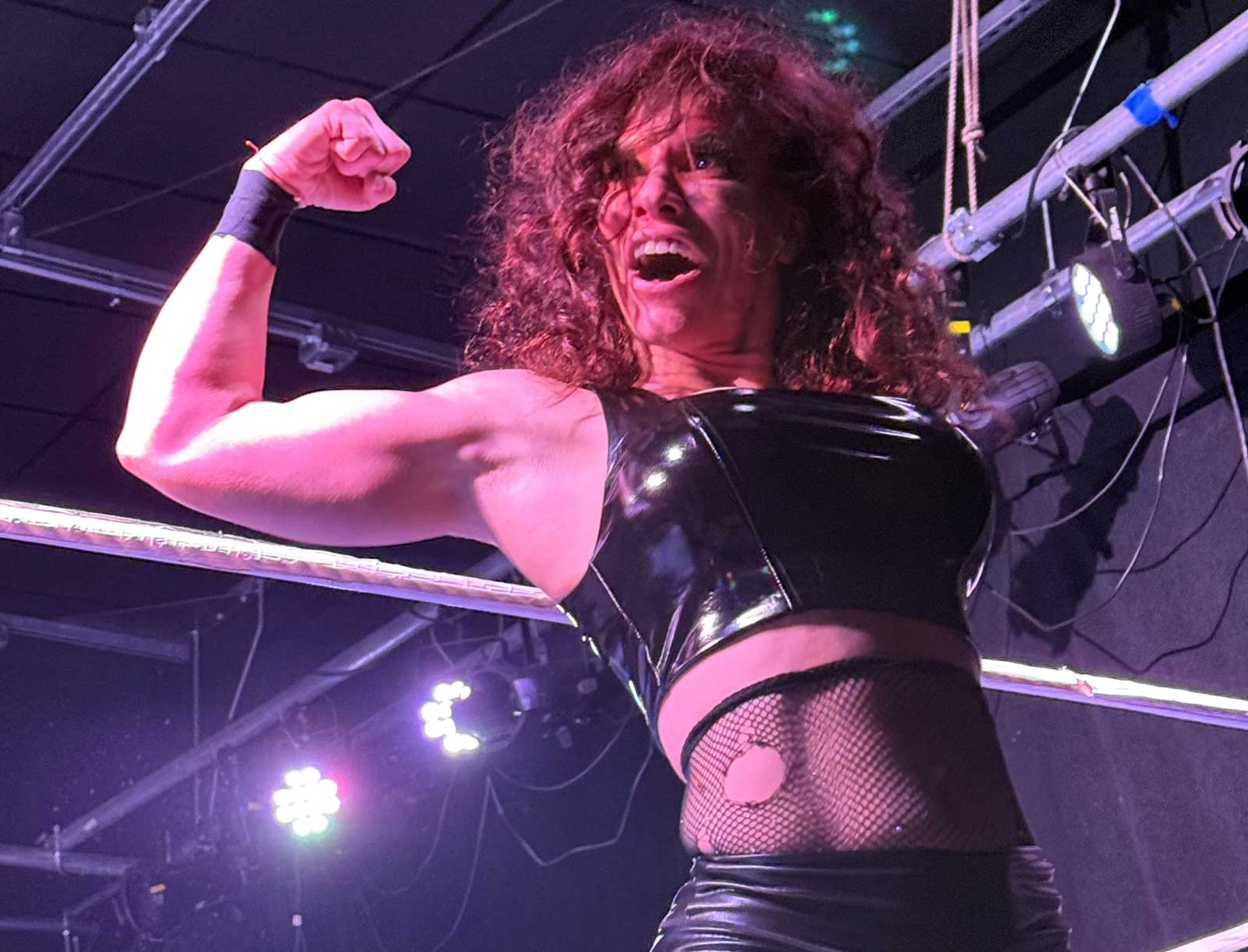 Benita Jean Shows Off Her Muscels at Kamikazes Club Photo Credit: Courtesy of Jeanette Langston
Benita Jean Shows Off Her Muscels at Kamikazes Club Photo Credit: Courtesy of Jeanette Langston
A lesson from Darth Vader
When Langston began wrestling, she said she didn’t imagine her persona as being someone particularly aggressive or mean.
“I’ve always been the goody-two-shoes girl, right? I’ve always been the one who likes to follow authority,” the Salt Lake City wrestler and artist said. “And so when I first got into it, I thought I wanted to be the hero, the baby face.”
Langston said she quickly realized that in the wrestling world, defining a personality is not so much about being the “good” or “bad” guy as it is about creating someone the audience can “get on board with.”
“If I’m the heel and I’m able to just run across the ring and, you know, just smash into the other guy who is in the corner, and that gets a reaction to where they’re just so mad at me for doing that, then I feel good,” she said. “I feel like I’ve accomplished it.”
Wrestling is more than a narrative involving the two participants in the ring. The audience is just as integral to how the story plays out. Langston said she first recognized this when she and her son attended a wrestling event that had a “Star Wars” theme.
One of the wrestlers strolled out to the “Imperial March,” dressed as the iconic villain Darth Vader. Langston’s son, an ardent “Star Wars” fan, began to cheer and raised his hand for a high five as the wrestler walked by. The wrestler turned, looking directly at her son, and exclaimed, “You suck, kid!”
Langston’s son was devastated, fighting back tears. In that moment, both mother and son were seething with hatred for the wrestler. They booed. They screamed. And that was exactly the reaction the wrestler wanted.
As she began designing her wrestling persona, Langston decided she should be everything she had always wanted to be, but had never had the chance to be. To gain a firmer grasp of these traits, she asked her closest friends why they were friends with her and what made them want to be her friends.
“A lot of the stuff that they were saying was, like, I was kind of passive, that I was easy to get along with because I was agreeable,” she said. “For a lot of my life, I’ve really wanted to speak up and say when I don’t like somebody, but I was told if you can’t say something nice, you don’t say anything at all. And so then I thought, ‘You know what? I want to be more of that person in the ring.’”
Benita Jean was born.
Langston’s journey into wrestling began when a friend brought her to a WWE Smackdown show in Salt Lake City. Langston was familiar with the sport, having grown up watching it with her brothers. Her favorite wrestler was “Macho Man” Randy Savage— known to wrestling fans for his 10 world championships and his friendships and feuds with Hulk Hogan. Fans also know his signature catchphrase, “Ooooh yeah,” as he snapped into a Slim Jim jerky snack. Langston loved his schtick.
Watching the sport as an adult, though, gave her a perspective she hadn’t considered when she was younger.
“I was immediately just, like, this is not just hilarious. This is fascinating because you have to be in good shape to be able to do these stunts and to get thrown on your back and then be able to get back up and do it to the other guy. They don't look like they’re winded, but they’re out there putting in some serious effort.”
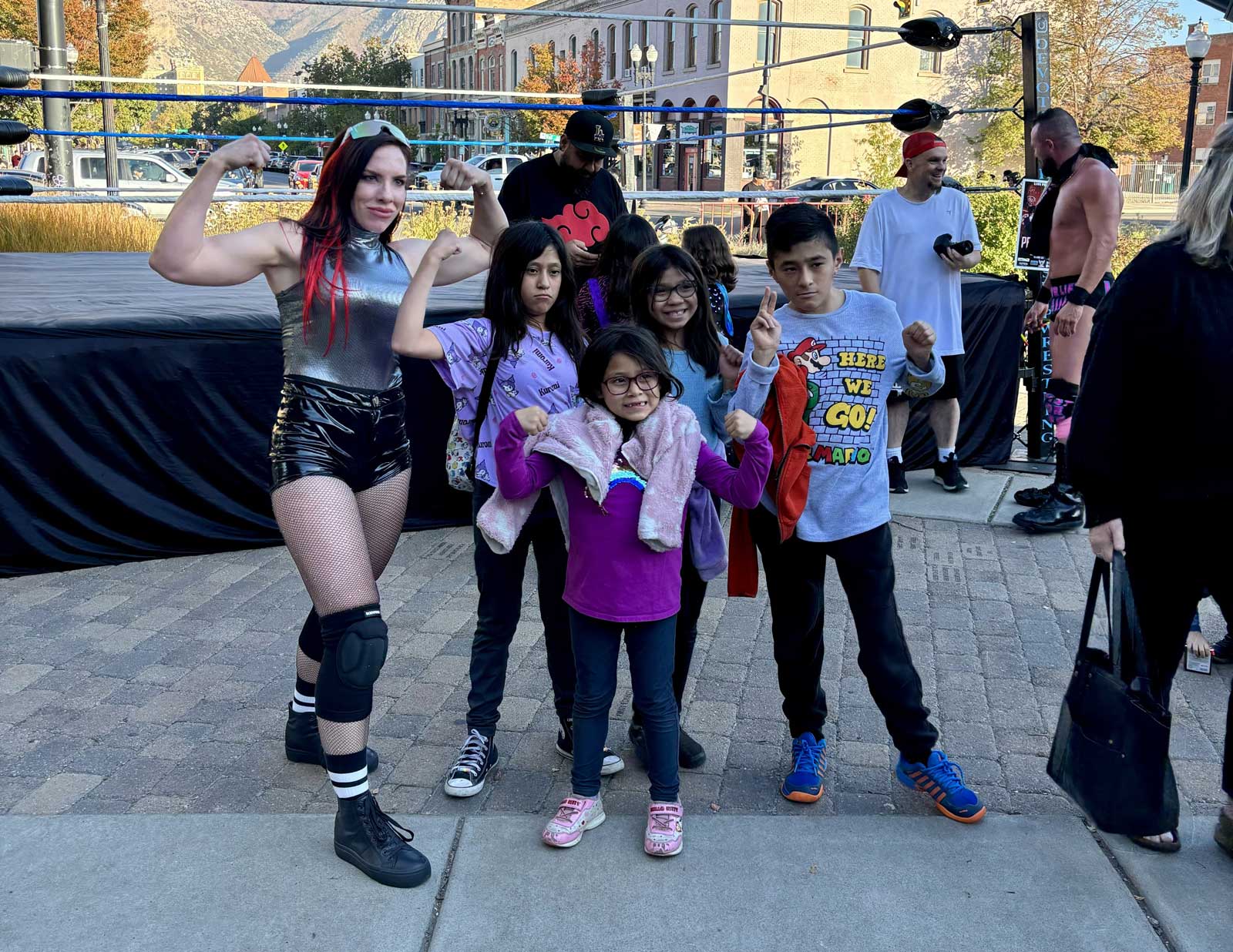 Benita Jean Poses with Young Fans Photo Credit: Courtesy of Jeanette Langston
Benita Jean Poses with Young Fans Photo Credit: Courtesy of Jeanette Langston
Becoming more than ‘eye candy’
After the Smackdown, Langston introduced her two sons to pro wrestling, showing them clips online. Soon after, Langston took one of her sons to a local event. There, she was approached by the organization’s owner, Manny Smith, who noticed Langston’s athletic build and enthusiasm for the performers.
Smith said Langston’s muscular look — she calls it “carved beef” — would be sure to draw crowds. He invited her to join the team.
There was precious little training involved, although Langston said she understood.
“If you’re a woman who has the right look, then you get the matches,” Langston said. “And then, because wrestling is pretty much a dance, then the other person can help to guide you through those moves so that you don't have to be an expert. You don't necessarily need to have years and years of training to go in and create a good show and a good match. And so that's a good thing. That’s what a well-sculpted athlete can bring to the sport.”
She acknowledged this attitude has a flip side, with women in wrestling becoming highly sexualized. To combat this, Langston said she has to know her boundaries and draw a line. Saying “I’m not comfortable with this,” up front, has proven to be a powerful tool for her, she said.
Langston said she has also had to be aware of when she’s being told lies about her performance, rather than honest feedback so she can improve. At times, it’s been a battle to prove she’s more than just “eye candy.” Comments like, “It must be nice to be a woman in this industry if you’re going to get all these different bookings,” have been more frequent than she would like.
“I feel that extra pressure that I need to prove to you that I’m working really hard and I’m working just as hard,” she said. “I’m putting in those reps at the gym and I’m making sure that my lifestyle is on par with what it is that I’m achieving out here.”
Despite these struggles, Langston said she encourages women to enter the sport if they desire to harness their “inner beast” and become new people in the ring. Pro wrestling, she said, has given her the chance to disprove the stereotypes and conventions others place on her.
“There are things that society says, like, [that] a 38-year-old woman, a mom, whatever, she doesn’t do that, she doesn’t say that,” Langston said. “She doesn't dress that way. She doesn’t act that way. She doesn’t interact with men or other women that way. I say, ‘Yes, she does.’”
 Benita Jean Speaks to the Audience at Dia De Los Muertos Event in Ogden Utah Photo Credit: Courtesy of Michael Serrano
Benita Jean Speaks to the Audience at Dia De Los Muertos Event in Ogden Utah Photo Credit: Courtesy of Michael Serrano
‘I got mad… then I got creative’
Langston said she has always wanted to entertain people, a desire that perhaps came from growing up in a family of eight kids, where it was a fight for parental attention. Back then, she would always try to make people laugh, finding fulfillment in evoking an emotional reaction.
Now she does it in a different way.
She recalled that at one match, the audience was “packed in like sardines.” Langston said she noticed one woman with a particularly bad seat, where her view of the ring was almost completely covered. In an effort to give her a great experience, Langston approached the woman and interacted with her as Benita Jean throughout the event. Once it was over, the woman gave Langston a huge hug and asked for pictures.
Langston and that woman, Stephanie Osuocha, are now friends.
“Having a friend that is in this male-dominated field feels one million billion percent better,” Osuocha said. “I know you have to overcome a lot in the entertainment industry and in a very athletic one at that, so it’s very, very inspiring.”
Langston said she is still getting used to that sort of power.
“For so long, I believed that reality was the box that people around me put me in and told me ‘This is where you stay. This is what you do, and this is how you believe.’ And I really thought that was reality and I believed it and I trusted it,” she said. “And then as soon as I allowed myself to think outside the box, I got mad, and then I got sad and then I got creative. …”
“I think it’s important for everybody to be given permission, right?,” Langston continued. “Like to be allowed to think about a different reality than what they are experiencing because then they can open their minds to different solutions to problems that arise. It is an immersive experience. That’s what I’m going for.”
And when she gets it, it’s not just as Benita Jean. It’s as Jeanette Langston, too.
Graham Jones wrote this story as a journalism student at the University of Utah for a capstone course focused on women’s sports. It is published as part of a collaborative including nonprofits Amplify Utah and The Salt Lake Tribune.







